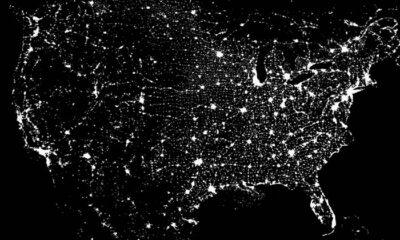A catastrophic failure of America’s electrical power grid because of a solar flare, sabotage or cyberattack is highly likely, experts told House members this month.
Two subcommittees of the House’s Committee on Science, Space and Technology heard testimony that confirmed many of our worst fears about the grid’s weaknesses.
Massive solar storms could cause widespread power blackouts, disable most electrical devices and result in $2 trillion in losses to the nation’s economy, Daniel Baker, a professor of planetary and space physics at the University of Colorado at Boulder, told the subcommittees.
“The occurrence of severe space weather impacting our nation’s infrastructure is not a question of if, but when,” Baker said, according to USA Today.
US Rep. Alan Grayson (D-Florida) said the situation is dire.
“Our electrical system is under constant stress from severe weather, malicious acts, and age,” Grayson said. “The stress on the system is constantly increasing as we dramatically change how we want to use the grid now, versus what it was designed to do, when it was built.”
The electrical grid was simply not designed to withstand the threats it faces today, including from terrorism and cyberattacks, Grayson and others said. Many of the components are increasingly old, obsolete, worn out and overworked.
“We as a society are increasingly dependent on the services electricity provides, and the electric grid has quietly become the basis of our modern lives,” Grayson said, according to the newspaper.
Groundbreaking Backup Solar Generator Delivers 4 Times More Power Than Other Models!
Some of the more disturbing revelations from the committee hearing included:
- Electrical utilities do not have adequate supplies of backup equipment and spare parts such as transformers for attacks that cause widespread physical damage, M. Granger Morgan, a professor of electrical and computer engineering at Carnegie Mellon University, told the subcommittees. He also noted that the government lacks such a stockpile. “Especially for terrorism, no single utility can really justify, in economic terms, making the investments for something like a transformer stockpile,” Morgan said. “On the other hand the nation as a whole should have it. Because there is a good chance that somewhere, sometime, we’re going to wish we had it.”
- Fuel supplies can be severely limited during power outages because most filing stations lack manual pumps or backup generators, Beyer said. That means there is no way to get gas and diesel fuel during a blackout.
- The grid simply was not designed to withstand sabotage, especially low tech attacks such as shooting out transformers with a rifle, Morgan noted.
- In addition to deliberate sabotage, the grid can suffer from a wide variety of natural disasters. Superstorm Sandy knocked out power to 8.5 million customers, Breyer pointed out. “Because the power system is spread out across the landscape, it’s inherently vulnerable to both natural and intentional physical damage,” Morgan said.
The grid was not designed to withstand physical or cyberattacks, which makes it far more vulnerable to sabotage, Nadya Bartol, the vice president of industry affairs and cybersecurity strategist for the Utilities Telecom Council, admitted to the subcommittees.
Story continues below video:
“The grid is based on layers that accumulated over time,” Bartol said. “The legacy infrastructure was not designed to be secured because security was not a concern when that infrastructure was implemented.”
Do you believe America is vulnerable to an attack on the power grid? Share your thoughts in the section below:
 Off The Grid News Better Ideas For Off The Grid Living
Off The Grid News Better Ideas For Off The Grid Living




